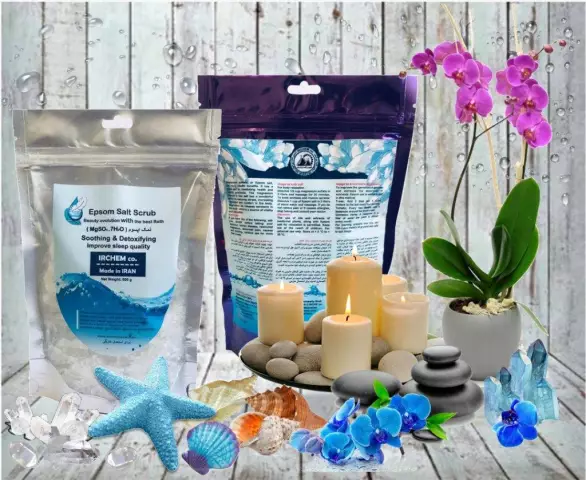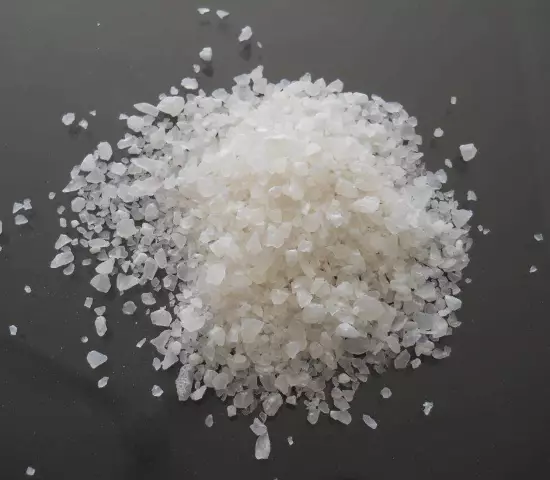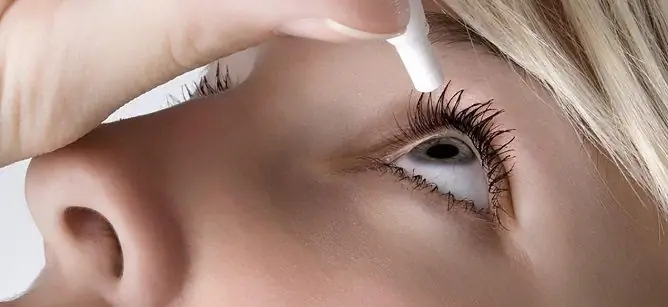- Author Rachel Wainwright [email protected].
- Public 2023-12-15 07:39.
- Last modified 2025-11-02 20:14.
Zinc sulfate-DIA
Zinc sulfate-DIA: instructions for use and reviews
- 1. Release form and composition
- 2. Pharmacological properties
- 3. Indications for use
- 4. Contraindications
- 5. Method of application and dosage
- 6. Side effects
- 7. Overdose
- 8. Special instructions
- 9. Application during pregnancy and lactation
- 10. Use in childhood
- 11. Drug interactions
- 12. Analogs
- 13. Terms and conditions of storage
- 14. Terms of dispensing from pharmacies
- 15. Reviews
- 16. Price in pharmacies
Latin name: Zinc sulfate-DIA
ATX code: S01XA
Active ingredient: zinc sulfate (Zinc sulfate)
Manufacturer: JSC "Institute of Molecular Diagnostics" Diafarm "(Russia)
Description and photo update: 2020-07-04

Zinc sulfate-DIA is an antiseptic and astringent drug used in ophthalmology.
Release form and composition
Dosage form - eye drops: colorless, transparent (in a cardboard box or a contour box placed in a heat sealable bag, 1 polymer bottle sealed with a dropper, or 1 glass bottle with a dropper cap, containing 5 or 10 ml of drops, as well as instructions on the use of Zinc sulfate-DIA).
Composition of 1 ml drops:
- active substance: zinc sulfate - 2.5 mg;
- auxiliary components: boric acid, purified water.
Pharmacological properties
Pharmacodynamics
Zinc ions take part in various biochemical reactions, stabilization and metabolism of cell membranes, influence regeneration processes, and are contained in the main enzymes. Their antimicrobial activity is due to the ability to coagulate proteins of microorganisms with the formation of albuminates. The astringent and drying effect of the drug depends on the depth of penetration. Also, the drug has a local anti-inflammatory property.
Indications for use
- blepharitis;
- conjunctivitis;
- prevention of infection of bacterial genesis when a foreign body enters the conjunctival cavity.
Contraindications
- dry eye syndrome;
- age up to 18 years;
- pregnancy;
- lactation period;
- established hypersensitivity to the components of the drug.
Zinc sulfate-DIA, instructions for use: method and dosage
Zinc sulfate-DIA drops are instilled into the conjunctival cavity.
A single dose (1-2 drops) is instilled 2-4 times a day. The duration of therapy, depending on the doctor's recommendations, varies from 5 to 14 days.
Side effects
During drug therapy, pain in the eyes and redness of their mucous membranes may occur. It is important to seek medical advice if these phenomena persist for more than 3 days.
Overdose
There are no data on overdose.
special instructions
Before starting drug therapy, it is recommended to consult a doctor.
Application during pregnancy and lactation
Zinc sulfate-DIA is not prescribed during pregnancy and during breastfeeding.
Pediatric use
Zinc sulfate-DIA is contraindicated in children under the age of 18.
Drug interactions
There are no data on the interactions of zinc sulfate with other drugs / substances.
Analogs
Analogs of Zinc sulfate-DIA are Zinc sulfate 0.25%, boric acid 2% solution in a tube-dropper; Zinc sulfate, Boric acid; Avitar.
Terms and conditions of storage
Store at temperatures up to 25 ° C. Keep out of the reach of children.
The shelf life is 2.5 years.
After opening, eye drops in a polymer bottle should be used within 21 days, in a glass bottle - 14 days.
Terms of dispensing from pharmacies
Dispensed by prescription.
Reviews of Zinc sulfate-DIA
Patients leave mostly positive reviews about Zinc sulfate-DIA. The advantages most often include the budgetary cost of the drug, high efficiency and rapid development of therapeutic action.
The most significant drawback is the appearance of a burning sensation in the eyes when the drug is instilled.
Price for Zinc sulfate-DIA in pharmacies
The approximate price for Zinc sulfate-DIA (1 polymer bottle containing 10 ml drops in the package) is 52 rubles.

Anna Kozlova Medical journalist About the author
Education: Rostov State Medical University, specialty "General Medicine".
Information about the drug is generalized, provided for informational purposes only and does not replace the official instructions. Self-medication is hazardous to health!






